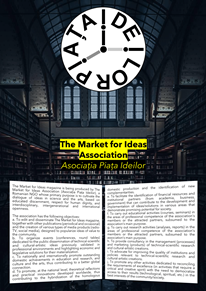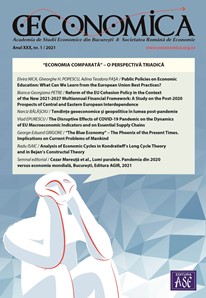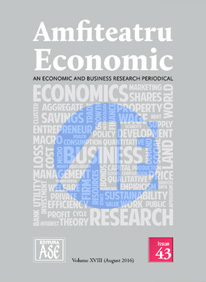
The Press – Social “Mediator” or “Instigator”?
On the 3rd of May we celebrate World Press Freedom Day. The power of the Press (hereinafter deliberately written with capital P, in speaking precisely of its societal vocation) and its impact on the average citizen and on the wider masses of the people is prodigious. As far as we are concerned, mass-media must act as a carrier and spreader of democracy, its values and of peace all over the world. The accuracy of reporting significant events to people around the globe is the most important factor when talking about what really matters regarding the primary role of the Press. War correspondents, sport reporters, photographers, columnists and journalists alike form a particular guild, mediating the transfer and processing of information from myriad sources and from event in most secluded corners of the world. The influence of mass-media, as the “fourth estate”, is significant. It takes only one article, one “breaking-news”, one new leak of information in order to stir up entire populations and raise the temperature of the entire world. And so, we might ask the question: what is the role of the mass-media? Is it to merely report events or to provoke and incite discussions, to engage in public debate in a deep way, in other words, to create dialectical forces and to push the boundaries on individual choice and social norms?
But it is not easy to make a perfect distinction between social norms, set rules and conventions as opposed to individual interests. Ideally, a democratic society is that in which these norms and rules are a frame that guide the manifestation for one’s own interests, rather than “enemies” which must be tricked, deceived, avoided or profited upon to others’ detriment. An activist Press becomes mired in social conflict, even as it pretends to stay aloof from it, like a general leading from behind the frontlines. It influences first by the power of suggestion, then by throwing well-placed “minishocks” of information on the most fertile ideological soil and then comes the difficult part, normalizing the new concepts, baiting the public attention into debating the problematics of the new situation and ultimately winning over the majority, which gets to democratically set the political agenda of society. It is the established course of events and we do not intend to object to that.
There are two observations to be made:
Firstly, given the incredibly rapid flow of information and the “globalized” character of our world, the big news of today is quickly spread to a very high number of people who are then exposed to the influence of the big ideological poles of our planet – especially the most significant democratic region powers, Europe and the United States, together with the shared history and ties which ensures a predominant role in the formation of general opinion. Instead of a variety of national positions, we have a variety of individual positions, united under the framework of democratic pluralism and mediated by the Press. Outwardly, the Press is still preoccupied with same subjects of “global importance”, the great shocks of the world, and the interdependencies leading to the dramas of Powers and other political entities. The Press may take on different aspects is generally divided into only a few distinct parts: the regions and continents which comprise countries who are or attempt to be liberal democracies; countries which are democratic in theory, but differ in its expression from the ones in the first category; and lastly countries which are not concerned with achieving democratic ambitions and are seen as a threat to or in total opposition to democratic processes. The Press as an institution finds its challenge in achieving a clarity which allows one to see that Press freedom is not just an issue in countries defined as “not free” by the putative democracies, but also in the wealthy countries which have ongoing problems with reconciling the reality of freedom with the ideal of freedom as stems from their institutions, habits and myths.
Secondly, the “profile” of certain publications (especially of the most important or prestigious ones) either identifies or even confounds itself with the trends and predominant ideals of the actuality (mass-media having contributed itself to the creation of these trends). We are less interested in the possible reasons that why might be so, through there is an echo in the previous paragraph. Not only are the “democratic” spirit of unity and socialization to be maintained, but also the often acrimonious “social debate” which generates the hidden reason of being for the Press, whether ratings or readership. The importance of a subject or the relevance in everyone’s daily existence are of lesser importance than the profitability of the subject, both from a financial and a social point of view. The Press has assumed the civic responsibility of providing the most fertile terrain for this and it is of the highest utility “to keep it going” that way.
The Press as a force which unites and divides has mastered the science to maintain the equilibrium between social unrest and a sufficient stability in order not to make itself responsible for possible revolts and great popular movements which can become damaging to the national safety or integrity, as long as these are in the interest of the Press. It is not for nothing that the Press has achieved such an importance that it long ago became a power of the state on its own, traditionally known as the “fourth estate”, theoretically beyond the People, political entities and power poles but in truth always in cooperation with all these, “molded” after them and, often, in a symbiotic relationship less with the People (whose interests and attitudes are quite varied) and more with the well-organized groups of interests attached to every single modern democracy we have witnessed. The connection between these entities is not a circular and cooperative line which works for the vaporous idea of real social progress, but a scale on the top of which opinion makers instill conditioned reflexes in the mentality of a disrupted world, as demonstrated by the evolution of the post-war society and reflected in the actual “crisis of democracy” all over the world.
Even with this conclusion, the Press and its power serve as the most efficient way to raise voices and take the pulse of societies. Although increasingly monopolized as a professional field, the Press has created something bigger than itself, especially with the advent of the Internet – the possibility of individuals and small groups of people to voice their discontent by cunningly imitating the mechanisms of the Press, and thus becoming influencers, a “goldmine” or a target for the media world. And as we live in a world of democracy, every time that someone suffers from a “misrule” on behalf of a system (social, political, economic) or even of another fellow citizen, the instinct of the injured party has become to express his discontent in the Press, while the other “informed” citizens are living in a state of nervous expectancy, waiting for these reactions as a perfect occasion to show their “compassion” (or other charitable deeds) or to add another “notch” to the tally of their respective political agendas. The Press has learned best how to identify, create and profit from such opportunities. In many cases, the wrongs of society and its institutions are overshadowed by scandals and sensational news, buzzworthy affairs that appeal through stridency, exoticness or some other facet of the recipes developed over time. Excessive trivialization is accompanied by the fading of the ideal of respectability or personal dignity, no matter the position occupied within society. Ranging from politicians to doctors and from activists to webcam stars, cartoonish lunatics and Sunday actors amuse a meaningless, but overinformed and thus misinformed society, deprived of the “entertainment” of the past, provided by anything else other than TV screens and electronic devices.
In the end, the Press of today is like a mirror not of the average citizen who lives a quiet existence on his own, but of the cultural elites of a society. The latest novelties and tendencies flow from the top to the bottom. It creates the tempting and alluring illusion of a “freedom” of speech and expression which has no real significance to creating any actual change or improvement in the society. Only the united and well-organized power of able individuals, coordinated by a “mastermind” can incite the modification of circumstances and realities, as we well know from the revolutions of the past where a tiny and intelligent minority was able to appeal to the people and their desires and channel them towards change, for good or ill.
As Mark Twain once said: “If you don’t read the newspaper, you are uninformed. If you do read the newspaper, you are misinformed”. The choice between staying uninformed or “risking” to take part in the mixture of misinformation, fake news, cunningly-placed catchphrases and leading phrases which instill either a positive or a negative mood or bias, is part and parcel of the challenges of the modern world, in which our discriminatory power in intellectual matters is decisive because the trustworthy authorities to which we previously outsources this are failing. In these current days, individual truths, personal judgment and particular norms applicable for an entire people are animated by the might of the media. The required mental gymnastics go hand in hand with the much-praised World Press Freedom. Quoting Mark Twain again: “There are laws to protect the freedom of the press’s speech, but none that are worth anything to protect the people from the press”.








